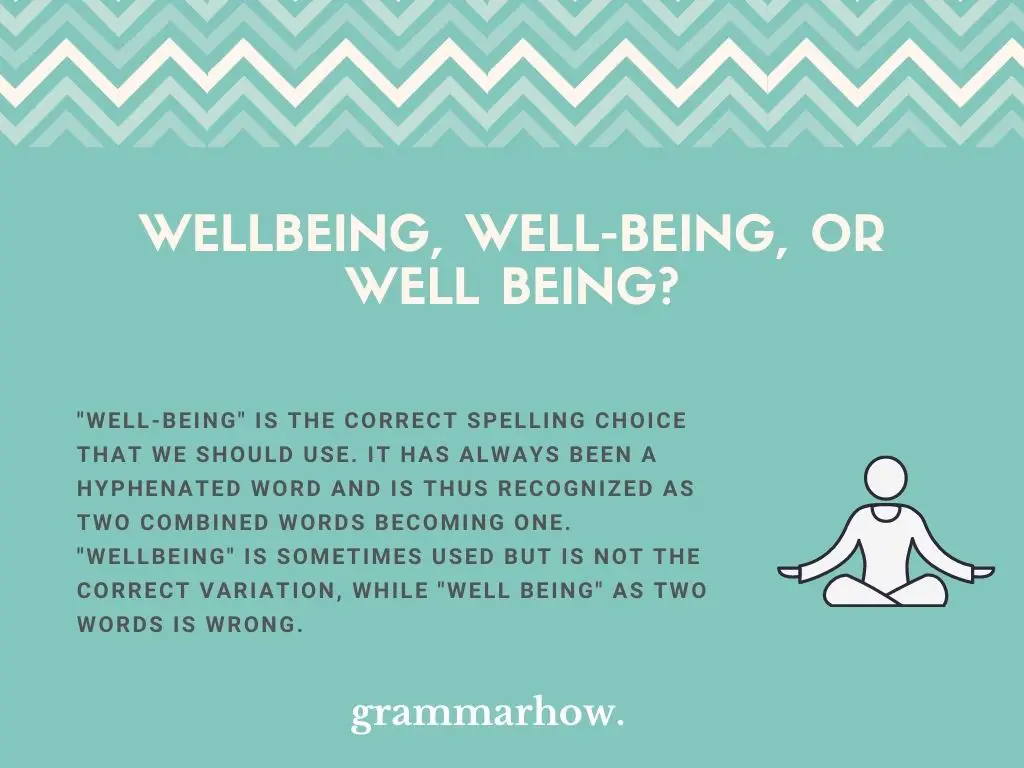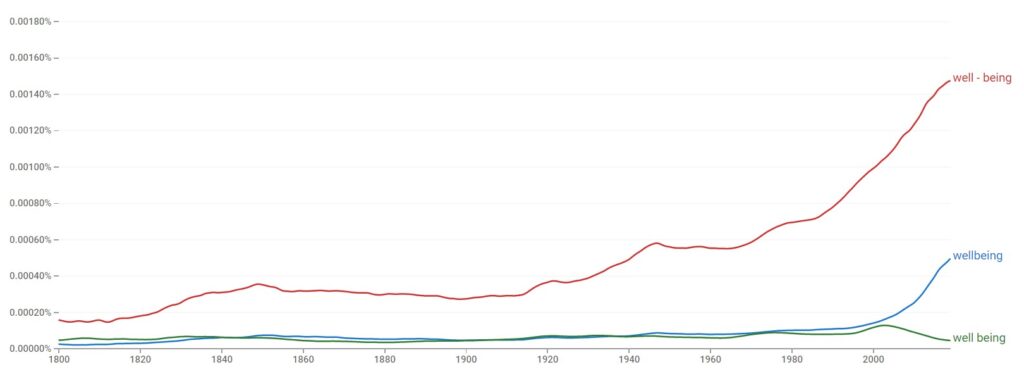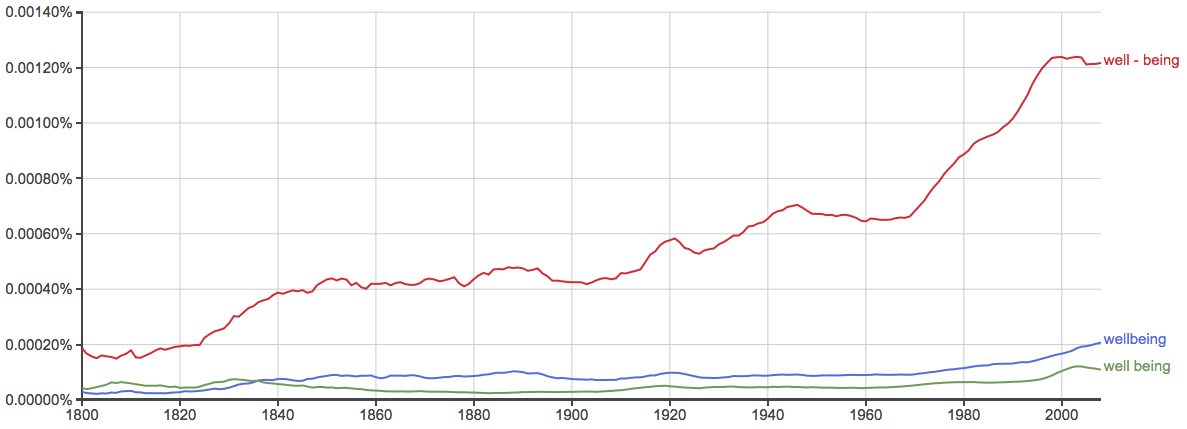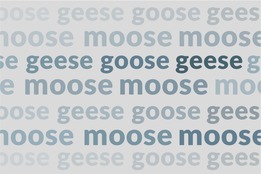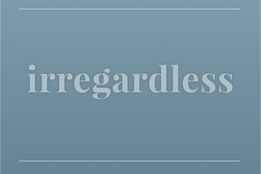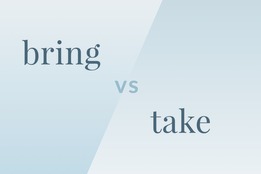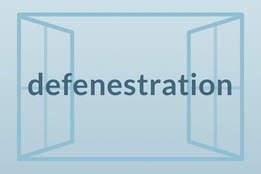“Well-being” is important to us all if we want to live long and healthy lives. However, it’s just as important to know whether the word is hyphenated or not. This article will look at whether “well-being” is one or two words and what you need to know about it.
“Well-being” is the correct spelling choice that we should use. It has always been a hyphenated word and is thus recognized as two combined words becoming one. “Wellbeing” is sometimes used but is not the correct variation, while “well being” as two words is wrong.
It might be useful for you to check out the following statistics to see what we mean about it:
According to Google Ngram Viewer, “well-being” is the most popular choice because it is the officially recognized spelling in English. We should make sure to include the hyphen whenever we write it, as native writers are much more familiar with it.
In the Cambridge Dictionary and The Oxford Dictionary, you will find that “well-being” with the hyphen is the acceptable spelling choice in both. However, The Oxford Dictionary does also mention that writing it as one or two words is sometimes acceptable (based on style choices).
Is “Wellbeing” One Word?
“Wellbeing” is not typically spelled as one word. We mentioned that it is recognized in The Oxford Dictionary as an alternative, but that does not mean it’s the right choice. We drop the hyphen to aid simplicity in most cases, but it is not always correct.
It’s best if we stick to the hyphenated rules of the word “well-being” wherever possible. While there might come a time in the future where “wellbeing” as one word will take over in popularity, for the time being, it’s best to stick to the hyphenated variation.
Some of these examples should help you to figure it out:
- Correct: My well-being is always in question when I’m at the doctor’s office.
- Incorrect: I think we need to talk about your wellbeing. You haven’t spoken about it in ages.
- Correct: I’m worried about your well-being. Is there anything we can do to help?
- Incorrect: Your wellbeing is a top priority for us, sir.
Remember, there is nothing fundamentally wrong with “wellbeing” as a one-word spelling. However, it is not the officially recognized spelling. That is why we’ve marked it as incorrect.
Is “Well Being” Two Words?
“Well being” is suitable as two words individually, but not when put together. Though it seems like it is occasionally used, the English language tends to avoid using the two-word variation because it is much clearer to hyphenate it in all styles.
These examples should help you to remember:
- Correct: Of course, your well-being is important to us! Why wouldn’t it be?
- Incorrect: His well being is of no concern to me, I’m afraid.
- Correct: Your well-being should be at the forefront of your mind! Be careful out there.
- Incorrect: I don’t want to discuss my well being with you any further.
Is “Well-Being” Hyphenated?
“Well-being” should be hyphenated in every case. It’s the officially recognized spelling, and it is the one that makes the most sense when you’re writing it. It has also been a hyphenated word for centuries, so it’s the one that English users are most familiar with.
Here are some examples that could help you with it:
- I think it’s time to look at my father’s well-being. I want him to be healthy.
- You haven’t got enough well-being to be doing something as risky as that!
- Your well-being does not matter anymore.
- You should have thought about your well-being before doing something so idiotic!
- I fear for my mother’s well-being!
As you can see, the hyphenated form makes the most sense. You should try and use it when possible (although the single-word option is sometimes acceptable).
Is “Being” Capitalized In The Word “Well-Being”?
“Being” does not need to be capitalized in “well-being” because it is not a proper noun. When used in a sentence, there is no need to capitalize it. However, if used in a title, it might be wise to capitalize it in the title style that capitalizes all words.
Some people like to capitalize every word in a title. Therefore, it makes the most sense to capitalize both words when they are part of a hyphen (even though they technically count as one word).
Martin holds a Master’s degree in Finance and International Business. He has six years of experience in professional communication with clients, executives, and colleagues. Furthermore, he has teaching experience from Aarhus University. Martin has been featured as an expert in communication and teaching on Forbes and Shopify. Read more about Martin here.
The English language is dynamic, and some words form new spellings over time. One good example is well-being or wellbeing,
Is wellbeing one word or two? And should you add a hyphen or not? Keep reading to know the correct spelling and how to spell it in the UK, USA, and Canada. You’ll also learn how to use the word in a sentence.
Is it Wellbeing or Well-Being?
The hyphenated term well-being is the correct term and not wellbeing or well being. Merriam-Webster Dictionary defines the noun well-being as the state of being healthy, happy, or prosperous. Separately, well is an adjective, while being is a verb or a noun. It’s necessary to add a hyphen to form a noun.
Which is Correct? Wellbeing or Well-Being
You already know that well-being is the correct term. Well is an adjective that means in a good way, while being can be a verb or noun. It’s not a compound adjective because it cannot modify another noun. Instead, it’s a noun that refers to the condition of being well.
- I’ve been on hiatus because my well-being isn’t at its best.
- Do diet and sleep affect health and well-being?
As a bonus trivia, you can only join two words with different parts of speech through a hyphen. That’s a significant clue that the spelling of the noun well-being is correct.
Use well-being when discussing physical and mental health, happiness, and other emotional and psychological aspects of life.
Wellbeing is a misspelling of the hyphenated term. Some writers have been using the one-word version, such as the New York Time bestseller WellBeing: The Five Essential Elements by Rath and Harter. But some dictionaries still do not recognize it.
Another misspelling of well-being is well being. It’s only correct if you use it in a sentence like this example:
- Robert Pattinson did well being Batman in the new movie.
Is it Wellbeing or Well-Being in the UK?
Both well-being and wellbeing are used in British English. However, wellbeing is more popular. Some spell check devices accept wellbeing, while others don’t. It also appears in several texts, such as The Sun and Sunday Times.
Is it Wellbeing or Well-Being in Canada?
Many people also wonder, is wellbeing one word or two in Canada. The hyphenated version well-being is more popular. And it’s a hyphen, not an em dash. This form is more common in North America, whereas well being is used in the UK, Australia, and other English-speaking countries.
How Do You Use Well-Being in a Sentence?
Well-being is usually used on persons or a group of people since it means the state of being healthy, happy, or prosperous.
- Healthcare workers are responsible for the health and well-being of all patients.
- Being accountable for your mistakes is a simple way to improve your well-being.
- Boost your confidence by prioritizing your emotional well-being.
- I applaud teachers who care about their student’s well-being.
- Painting is suitable for your well-being.
- Watering the plants and leaving them under the sunlight will improve their well-being.
- Cooking is not just a coping mechanism. This new hobby has improved my overall health and well-being.
Examples of Well-Being in Writing
“DEEPAK CHOPRA™ MD, FACP, founder of the Chopra Foundation, a non-profit entity for research on well-being and humanitarianism, and Chopra Global, a whole health company at the intersection of science and spirituality.” (The Washington Post)
“Nearly half of the states in the U.S. saw their scores decline and zero states saw a significant improvement in well-being from 2016 to 2017, according to the Gallup-Sharecare Well-Being Index released Tuesday.” (USA Today)
Well-Being Synonyms
- Welfare.
- Security.
- Wellness.
- Comfort.
- Safety.
- Happiness.
- Health.
- Profit.
- Success.
- Prosperity.
Well-Being is Correct
Is wellbeing one word or two? Generally, it’s one word but includes a hyphen. But in the UK and other English-speaking countries, wellbeing is acceptable.
The term is synonymous with welfare and wellness. If you’re still unsure, go for well-being instead of wellbeing, no matter who your audience is!Learn more about hyphenated words like dead-set and shut-in for your writing.
Словосочетания
Автоматический перевод
благополучие, здоровье
Перевод по словам
well — ну, что ж, уж, хороший, хорошо, вполне, колодец, бить ключом
be — быть, находиться, должен, тратта
Примеры
A good meal promotes a feeling of well-being.
Хорошая еда способствует ощущению благополучия /хорошему самочувствию/.
He confided to her his anxiety for the well-being.
Он поделился с ней своим страстным желанием благополучия.
His concern with the well-being of his family is obvious.
Его озабоченность благополучием своей семьи очевидна.
The care and well-being of patients should always come first.
Обслуживание и благополучие пациентов всегда должны стоять на первом месте.
We are now concerned for the economic well-being of the country.
Мы сейчас озабочены экономическим благосостоянием страны.
We are responsible for the care and well-being of all our patients.
Мы несём ответственность за заботу о наших пациентах и за их благополучие.
- Top Definitions
- Quiz
- Related Content
- More About Well Being
- Examples
- British
This shows grade level based on the word’s complexity.
[ wel—bee-ing ]
/ ˈwɛlˈbi ɪŋ /
See the most commonly confused word associated with
wellness
This shows grade level based on the word’s complexity.
noun
a good or satisfactory condition of existence; a state characterized by health, happiness, and prosperity; welfare: to influence the well-being of the nation and its people.
COMPARE MEANINGS
Click for a side-by-side comparison of meanings. Use the word comparison feature to learn the differences between similar and commonly confused words.
QUIZ
CAN YOU ANSWER THESE COMMON GRAMMAR DEBATES?
There are grammar debates that never die; and the ones highlighted in the questions in this quiz are sure to rile everyone up once again. Do you know how to answer the questions that cause some of the greatest grammar debates?
Which sentence is correct?
Origin of well-being
First recorded in 1605–15
Words nearby well-being
well-aware, wellaway, well-balanced, Well begun is half done, well-behaved, well-being, well-beloved, well-blessed, wellborn, well-bred, well-built
Dictionary.com Unabridged
Based on the Random House Unabridged Dictionary, © Random House, Inc. 2023
MORE ABOUT WELL BEING
What does well-being mean?
The well-being of someone or something is its welfare or overall condition or state of health. A high level of well-being means that the overall condition is healthy and positive.
Well-being can also refer to a specific aspect of one’s health, and it is often preceded by words like mental, physical, emotional, spiritual, and the like. Well-being is most often applied to people and communities but it can also be applied to things, especially organizations or institutions, such as a nation, economy, or educational system. It is sometimes spelled without the hyphen (well being) or as one word (wellbeing).
Example: I hate to call out sick so close to my deadline, but I’m trying to prioritize my well-being instead of constantly pushing myself.
Where does well-being come from?
The first records of well-being come from before the 1600s. Since its earliest use, it has referred to an ongoing condition of health or welfare. That ongoingness is indicated by the fact that being is a gerund—the continuous (-ing) form of a verb (in this case, be) that functions as a noun. The same construction is seen in the (much less commonly used) opposite of well-being: ill-being.
A state of well-being is a state of being well. Close synonyms for well-being are wellness and welfare. But while wellness is often used in the context of physical and mental health, and welfare generally refers to safety or prosperity, well-being is often used generally to refer to an overall state or an overall state of mind. When you say you’re trying to maintain your overall well-being, it means you’re doing what you can to stay healthy, safe, comfortable, and happy. Sometimes, though, well-being is discussed in terms of a more specific aspect of one’s overall state, such as one’s mental, physical, or emotional well-being.
Well-being can also be applied to systems or other entities, as in Having an accountant will help the well-being of your business or The economic well-being of the country is on the decline.
Did you know … ?
How is well-being used in real life?
Well-being is most commonly used in the discussion of people’s mental and physical health, but it can be applied in many different contexts.
Even 15 minutes of time in the forest has been scientifically proven to improve your mental and physical well-being. https://t.co/5CWHfjp5Lg
— JSOnline – NewsWatch (@js_newswatch) March 27, 2020
Being outside all day today did wonders to my overall well-being🌞
— madison (@madisonleslie_) March 25, 2020
Economic well-being affects a child’s education achievement in multiple ways. Studies have shown that a family’s socioeconomic status positively contributes not only towards a child’s educational attainment, but towards their academic performance as well➡️https://t.co/bEzinHO2PC
— Global Education Monitoring Report UNESCO (@GEMReport) March 27, 2020
Try using well-being!
Is well-being used correctly in the following sentence?
Studies have shown that spending time outside can significantly improve one’s overall sense of well-being.
Words related to well-being
comfort, contentment, happiness, health, prosperity, protection, safety, security, success, welfare, eudemonia, profit, advantage, benefit, ease, good, weal
How to use well-being in a sentence
-
The health, happiness and well-being of men, children and women improve.
-
My exes were more concerned with my well-being because of everything I was going through.
-
You know things have gotten bad when TMZ is afraid for your well-being.
-
Businesses have a significant influence on the lives of their employees and the well-being of communities they operate within.
-
There are yogis who actually meditate, pray, and are deeply concerned with the survival and well-being of our planet.
-
Generally at such times she did not think of anything, but lay immersed in an inarticulate well-being.
-
Anyway, he was not going to offer material resistance to something which was concerned with the well being of Helen Ervin.
-
It also greatly disturbed the internal unity of the Church, and that in a manner peculiarly prejudicial to its well-being.
-
Dear reader, your future well-being in all time to come, depends upon your rightly understanding these seven subjects.
-
The sun was deliciously hot; its rays struck through to the skin, and seemed to pour in life and well-being.
British Dictionary definitions for well-being
noun
the condition of being contented, healthy, or successful; welfare
Collins English Dictionary — Complete & Unabridged 2012 Digital Edition
© William Collins Sons & Co. Ltd. 1979, 1986 © HarperCollins
Publishers 1998, 2000, 2003, 2005, 2006, 2007, 2009, 2012
What is the difference between wellbeing and well-being?
His Holiness, the 14th Dalai Lama, once tweeted, “Compassion is concern for others–– sincere concern for others well-being founded on awareness of our experiences.” Whether you agree with the message or not, he’s got one thing right: it’s well-being, not wellbeing.
You don’t have to be a Tibetian monk to understand the difference between wellbeing and well-being. The two words represent the same concept, but only one of them possesses the correct spelling: “well-being.”
Well-being ≠ wellbeing
It’s not hard to understand why so many writers misspell the word well-being. After all, there are several grammar rules that dictate the use of hyphens and compound words. But that’s the trick: the word ‘well-being’ isn’t a compound word.
The word “well” of well-being is an adjective, while “being” (i.e., ‘state of being’ or ‘existence’) is a noun. Together, they form a distinct word that cannot modify another noun. Therefore, they must include a hyphen to convey a unique concept: ‘the condition of being well.’
Depending on how specific the topic is, we can use the word well-being to encompass mental health, life satisfaction, or physical health with phrases like ‘emotional well-being,’ ‘psychological well-being,’ or ‘physical well-being.’
It’s only within these phrases that “well-being” joins a compound phrase because words like ’emotional,’ ‘psychological,’ or ‘physical’ are all modifying adjectives. Typically, compound phrases with a modifying adjective are also hyphenated. But since ‘emotional well-being’ is not yet accepted as it’s own word, the phrase remains open.
Additional tricky terms include:
- Public health (not public-health)
- Health care or healthcare (not health-care)
- Caregiver (not care giver)
- Preexisting (not pre-existing)
- Physical health (not physical-health)
- Mental health (not mental-health)
What does well-being mean, anyways?
The word well-being (wɛlˈbi) is a mass noun defined as ‘the state of health, happiness, or prosperity.’ The noun is synonymous with the noun “welfare,” which Merriam-Webster’s Dictionary defines as, “The state of doing well” regarding “one’s happiness or success.”
But outside of linguistic sources, health care providers have a more comprehensive understanding of what “well-being” means to them. For instance, the Mayo Clinic’s Well-Being Index measures its employee’s level of ‘wellness’ based on factors involving work-life integration, coping mechanisms, and their quality of relaxation.
Example sentences with “well-being” include:
“I am concerned about your well-being.”
“Counselors assess their patient’s well-being by tracking reports of negative vs. positive emotions.”
“Some people believe their well-being depends on good fortune, while others believe it requires good health.”
Synonyms
Bliss, comfort, eudaimonia, felicity, fitness, good, healthiness, joy, protection, prosperity, security, success, weal, welfare, wellness, wholeness.
Antonyms
Ill-being, misery, sadness, suffering, unhappiness, unhealthiness, wretchedness.
How to use well-being in a sentence?
To use the word well-being in a sentence correctly, it’s important to remember that it’s a noun. We cannot use “well-being” to modify other adjectives, verbs, or adverbs. And, as always, remember the hyphen!
Recent examples from online publishers include:
“Older people report feeling higher satisfaction, happiness and well-being — and less anxiety, depression and stress …” –– The New York Times
“Emotional well-being has a real impact on physical health.” –– Earth
“As COVID-19 threatens the health and well-being of people and communities across North America, financial-services firm Edward Jones is committing $2.7 million to support national and community organizations…” –– AP News
“Scientific literacy is critical to our nation’s well-being.” –– MinnPost
“‘Any suggestion to the contrary is a threat to the health and well-being of New Yorkers.’” –– The Oregonian
Additional reading
If you’re interested in learning more about health-related grammar, check out our blogs on topics, such as:
- Affective vs. Effective
- Jealousy vs. Envy
- Empathy vs. Sympathy
- Psychopath vs. Sociopath
FAQ: Related to wellbeing vs. well-being
Is well-being hyphenated in other languages?
The noun well-being doesn’t contain a hyphen in all languages. For example, the Spanish word for well-being is ‘bienestar,’ while Italian uses ‘benessere.’ However, French does hyphenate ‘bien-être,’ while Portuguese leaves it open with ‘bem estar.’
Additional translations of well-being include:
Afrikaans: welstand
German: Wohlbefinden or Gemütlichkeit
Vietnamese: hạnh phúc
Swahili: ustawi
Japanese: Kōfuku
Zulu: inhlala-kahle
Test Yourself!
Learning new words is difficult, but “well-being” doesn’t need to be one of them. Perfect your understanding of wellbeing vs. well-being with the following multiple-choice questions.
- Which of the following spellings is correct?
a. Well being
b. Wellbeing
c. Well-being
d. All of the above - True or false: well-being is a compound word.
a. True
b. False - Which of the following words is a compound word?
a. Public health
b. Health care
c. Caregiver
d. All of the above - Which of the following terms is not a synonym of well-being?
a. Eudaimonia
b. Protection
c. Wretchedness
d. Welfare - The word well-ness is a _____________.
a. Noun
b. Verb
c. Adjective
d. A and C
Answers
- C
- B
- D
- C
- A
Sources
- “Being.” Lexico, Oxford University Press, 2020.
- Brody, Bob. “Why It’s Good to Be Old, Even in a Pandemic.” The New York Times, 28 July 20200.
- “Edward Jones Commits Support for Communities in Response to COVID-19.” The Associated Press, 21 Apr 2020.
- “German Word of the Day: Die Gemütlichkeit.” The Local, 27 Sept 2018.
- Sun, Lena H., Amy Brittain. “Meet the New York couple donating millions to the anti-vax movement.” The Oregonian, 19 June 2019.
- “Welfare.” The Merriam-Webster.com Thesaurus, Merriam-Webster Inc., 2020.
- “Well.” Lexico, Oxford University Press, 2020.
- “Well-being.” The American Heritage Dictionary of the English Language, 5th ed., Houghton Mifflin Harcourt Publishing Company, 2020.
- “Well-being.” Lexico, Oxford University Press, 2020.
- “Hyphenation Principles.” APA Style, American Psychological Association, 2020.
Since English has been spoken for hundreds of years, some constructions and word combinations that were invented several centuries ago seem odd today. The noun well-being seems like it could be formed as a compound, like wellbeing, or left as separate words, as well being, but despite its length history, only one spelling has ever been standard.
The word pairing well-being has been in use since the 16th century, and, ever since the beginning, there has only been one standard spelling.
Continue reading to find out.
In this post, I will compare wellbeing vs. well-being. I will outline which of these spellings is correct and guide you on its correct use.
Plus, I will show you a helpful memory tool that will help you choose well-being or wellbeing in your own future writing.
When to Use Well-being

A considerate person acts to promote the well-being of others, and doctors practice medicine to prolong and enhance the well-being of patients.
The sentences below are examples of well-being in context,
- “We have to consider the well-being of the child when making a foster home placement,” said the director.
- Well-being is a function of a healthy lifestyle, a positive view of one’s place in the world, and the support of valued peers.
Well-being is an old word. Merriam-Webster notes its first recorded use in 1561, nearly five centuries ago. At this point in history, well-being is the established and predominant spelling (see below) and a well-established part of the English language.
When to Use Wellbeing

Some writers do not hyphenate well-being, separating the two words into well being. This, too, is nonstandard and most style guides advise against it. The AP Stylebook and Garner’s Modern English Usage, for instance, both state that well-being is hyphenated.
This, however, doesn’t mean these words will never appear adjacent to one another in sentences.
For example,
- Alex Rodriguez did well being a shortstop for the Seattle Mariners, but when be played third base for the New York Yankees, he came to be perceived as a villain.
As you can see, well and being appear next to each other in the sentence above. In this sentence, however, the words do not carry the same meaning as the hyphenated well-being.
Additionally, the graph below, which charts well-being vs. wellbeing vs. well being over time, illustrates the points made above: well-being is much more common than wellbeing and well being in modern English.
This graph is not scientific (it only looks at books published in English since 1800), but it clearly illustrates a dominant long-term trend.
Trick to Remember the Difference
The hyphenated well-being is the standard form of this noun. The single-word wellbeing and the two-word well being are not accepted variants.
Remember that well is an adjective and being is a verb. To form a noun, they must be hyphenated; well-being is not a compound word.
Remember that when words that are different parts of speech are combined, they are hyphenated. The hyphen in well-being is your clue that it is the correct version of this word.
Summary
Is it wellbeing or well-being? Well-being is a noun that means good health or good fortune.
- Well-being is a synonym of the words wellness and welfare.
- Wellbeing and well being are nonstandard variants of this noun, and should be avoided.
To summarize succinctly,
- Use well-being
- Avoid wellbeing or well being.
Contents
- 1 Which is Correct? Wellbeing or Well-Being?
- 2 When to Use Well-being
- 3 When to Use Wellbeing
- 4 Trick to Remember the Difference
- 5 Summary
-
#1
Hello to all.
I’m in doubt here: Do you write wellbeing, well-being or well being?? I was sure it was wellbeing and have found it spelled like that in the wordreference English only dictionary and «no entry for «well-being». But in the En-Sp one it’s spelled well-being http://www.wordreference.com/es/translation.asp?tranword=well-being and online you find well being as well.
Can someone help me?
Thanks in advance.
K
-
#2
English doesn’t have definite rules for this — it is common for compounds to be written in each of these three ways. There is nothing to say one is better than another. One might be more commonly used than another.
-
#3
Well-being: A feeling of being comfotable, healthy, and happy.
Example:
We try to ensure the well-being of our employees.
Refernce: Longman dictionary
-
#4
I think wellbeing is less common. I find wellbeing hard to read because of all the llllllls in a row — it looks strangely like wellloeing.
Last edited: Aug 1, 2013
-
#5
The WR (Collins) dictionary is British, and opinion seems to be split in the UK, while the US position is consistent.
From my own bookshelf:
American Heritage Dictionary and Random House Webster’s College Dictionary (also American): well-being
Concise Oxford English Dictionary (British): well-being
Chambers 21st Century Dictionary (British): wellbeing
My browser’s spelling checker (American) says that spelling it without the hyphen is wrong.
-
#6
from the Grammarist website: In much of the English-speaking world, including in the U.K. and especially in Australia, wellbeing is usually one word, with no hyphen. Though the hyphenated form is older and remains acceptable everywhere, the one-word form has existed for several centuries and has grown steadily more common over the years. Today it is not questioned outside North America.
-
#7
I’ve been using «wellbeing» in all of the spa work I’ve written in Asia in the last couple of decades – why? because everyone else is doing it.
-
#9
That doesn’t mean anything. They don’t decide such things, they don’t invent rules, all any dictionary does is record usage, and smaller ones like those just pick one and use that as an example. The other forms remain equally correct, as anyone at Oxford or Cambridge would tell you.
-
#10
I’ve been using «wellbeing» in all of the spa work I’ve written in Asia in the last couple of decades – why?
… because of the nymphs and water sprites who live in the spa’s well.
-
#12
The answer around questions like this is to define your style guide and reference dictionary. In a perfect world, your client/boss would tell you what these are and make your life easy. But for a lot of translators and writers, we will not have such specific guidance.
If you are using Chicago Style, use the Merriam-Webster dictionary — in which case it is hyphenated.
If you are using Cambridge Style, then use the Cambridge dictionary — in which case it is still hyphenated.
I came here because in Canada it is a bit more complicated.
The Federal Government style guide prefers the Canadian Oxford Dictionary and the Gage, but both of these are 20 years old. It lists «well-being», following the Canadian Oxford. The Canadian Press Style Guide also uses the Canadian Oxford.
However, the Collins Canadian Dictionary has «wellbeing», and this as of 2008 (so after either of the dictionaries mentioned above). The Collins’ most recent edition is from 2016, but it is not listed as the reference for any style guide I am aware of. It is the most widely used dictionary in Canada, so it feels like that should be worth something, especially since the others are basically dead projects.
I hyphenate this work at work even though I make it a single word in my personal life. If anyone else is into the boring details of Canadian English, I’d love to hear your thoughts.
It has disproved the notion that elderly patients cannot understand a philosophical concept such as existential well—being.
Transitions to caregiving, gender, and psychological well—being : a prospective us national study.
Both of these subscales are scored so that high scores indicate greater psychological well—being and vitality.
The impact of singing on children’s psychological state and well—being was investigated with a participant population of 76 pre-pubertal children.
Singing seemed to influence their psychological well—being and mental states significantly.
Other studies indicate that the quality of home and work roles intersect in important ways to predict well—being.
His evaluation of person i’s well—being is unlikely to be the same as someone else’s evaluation of i’s well—being.
Unlike utility, well—being is not necessarily related to the ordering on the basis of which the person chooses.
The associations of individual variation in well—being with both a person’s ‘ temporal commitment ‘ to the area and to facets of their social integration are analysed.
Positive coping strategies — albeit not associated with symptoms — may be stronger associated with other dimensions of well—being.
Other critics go further, and say that the challenge model is inimical to human well—being.
And how soon should the new advances be adopted and applied for the well—being of the individual, the family, and the population at large?
One may be able to successfully increase one’s own wellbeing without increasing, and possibly decreasing, the well—being of others.
Anything that worsens a population’s economic well—being has the effect of increasing vulnerability to disease as well as to external pressures.
However, the expenditure curve cannot continue falling indefinitely, but reaches a point where well—being is critical.
These examples are from corpora and from sources on the web. Any opinions in the examples do not represent the opinion of the Cambridge Dictionary editors or of Cambridge University Press or its licensors.
Thesaurus
Synonyms of well-being
-
as in welfare
- as in welfare
-
Related Articles
-
Entries Near
-
-
Cite this EntryCitation
-
Share
-
More from M-W
Show more -
-
Show more
-
Citation
-
Share
-
More from M-W
-
-
-
To save this word, you’ll need to log in.
Log In
-
To save this word, you’ll need to log in.
well-being
noun
Definition of well-being
as in welfare
the state of doing well especially in relation to one’s happiness or success
we’re only doing this for your own well-being
Synonyms & Similar Words
Relevance
-
welfare
-
health
-
happiness
-
interest
-
sake
-
prosperity
-
success
-
good
-
weal
-
successfulness
-
wellness
-
fitness
-
joy
-
healthiness
-
soundness
-
benefit
-
wholeness
-
wholesomeness
-
satisfaction
-
prosperousness
-
robustness
-
gratification
-
contentedness
-
bliss
-
felicity
-
advantage
-
content
-
fortune
-
gain
Antonyms & Near Antonyms
-
ill—being
-
suffering
-
unhappiness
-
unhealthiness
-
unsoundness
-
sadness
-
misery
-
wretchedness
-
ill—being
-
suffering
-
unhappiness
-
unhealthiness
-
unsoundness
-
sadness
-
misery
-
wretchedness
See More
Articles Related to well-being

Can You ‘Feel Good’?
We certainly hope so.
Thesaurus Entries Near well-being
well-behaved
well-being
wellborn
See More Nearby Entries 
Cite this Entry
Style
“Well-being.” Merriam-Webster.com Thesaurus, Merriam-Webster, https://www.merriam-webster.com/thesaurus/well-being. Accessed 14 Apr. 2023.
Copy Citation
Share
More from Merriam-Webster on well-being
Nglish: Translation of well-being for Spanish Speakers
Britannica English: Translation of well-being for Arabic Speakers
Love words? Need even more definitions?
Subscribe to America’s largest dictionary and get thousands more definitions and advanced search—ad free!
Merriam-Webster unabridged

Can you solve 4 words at once?
Can you solve 4 words at once?
Word of the Day
lackadaisical
See Definitions and Examples »
Get Word of the Day daily email!
Words at Play
-
12 Political PutdownsFor When ‘Lowdown Crook’ Isn’t Specific Enough
-
Absent Letters That Are Heard AnywayWhen letters make sounds that aren’t associated w…
-
Better Ways to Say «This Sucks»Go on…make your English teacher proud.
-
When Were Words First Used?Look up any year to find out
Ask the Editors
-
Weird PluralsOne goose, two geese. One moose, two… moose. Wh…
-
IrregardlessIt is in fact a real word (but that doesn’t mean …
-
Bring vs. TakeBoth words imply motion, but the difference may b…
-
DefenestrationThe fascinating story behind many people’s favori…
Word Games
-
Name That Hat!Time to put on your thinking cap.
Take the quiz
-
Name That FlowerCan you tell the difference between a lilac and a…
Take the quiz
-
Name That ThingYou know what it looks like… but what is it cal…
Take the quiz
-
Spelling Bee QuizCan you outdo past winners of the National Spelli…
Take the quiz

